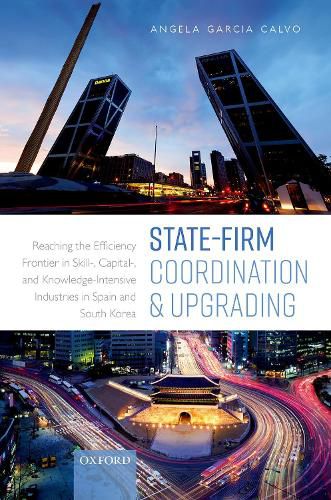Readings Newsletter
Become a Readings Member to make your shopping experience even easier.
Sign in or sign up for free!
You’re not far away from qualifying for FREE standard shipping within Australia
You’ve qualified for FREE standard shipping within Australia
The cart is loading…






Since the 1980s, Spain and South Korea have experienced a dramatic transformation from middle-income to advanced economies. While market liberalization and globalization were important forces for change, and while states continue to be central in the organization of the Spanish and South Korean economies, the liberal and the developmental state perspectives do not provide an understanding of critical elements of these transformations. Building on a combination of historical institutionalism and international business literature, this book shows that upgrading was underpinned by cooperative models based on interdependencies and quid pro quo exchanges between national governments and large firms. The negotiated nature of these arrangements opened the door to institutional variation and enabled Spain and South Korea to pursue different strategies. Spain pursued an integrational approach based on foreign direct investment, technological outsourcing, and regional integration. South Korea pursued a techno-industrial strategy that prioritized self-sufficiency and the development of local technological capacity. Both strategies enabled Spanish and South Korean firms across multiple complex sectors to reach the efficiency frontier, but resulted in different productive specializations in complex services and manufacturing respectively.Through a comparative study this book shifts our perspective on the political economy of economic transformation: from markets or states, to state-firm coordination, as a driver for economic transformation; from one, to at least two, different pathways to upgrading; and from a world divided into emerging economies and world leaders, to a more nuanced perspective that recognizes the perspective of new advanced economies.
$9.00 standard shipping within Australia
FREE standard shipping within Australia for orders over $100.00
Express & International shipping calculated at checkout
Since the 1980s, Spain and South Korea have experienced a dramatic transformation from middle-income to advanced economies. While market liberalization and globalization were important forces for change, and while states continue to be central in the organization of the Spanish and South Korean economies, the liberal and the developmental state perspectives do not provide an understanding of critical elements of these transformations. Building on a combination of historical institutionalism and international business literature, this book shows that upgrading was underpinned by cooperative models based on interdependencies and quid pro quo exchanges between national governments and large firms. The negotiated nature of these arrangements opened the door to institutional variation and enabled Spain and South Korea to pursue different strategies. Spain pursued an integrational approach based on foreign direct investment, technological outsourcing, and regional integration. South Korea pursued a techno-industrial strategy that prioritized self-sufficiency and the development of local technological capacity. Both strategies enabled Spanish and South Korean firms across multiple complex sectors to reach the efficiency frontier, but resulted in different productive specializations in complex services and manufacturing respectively.Through a comparative study this book shifts our perspective on the political economy of economic transformation: from markets or states, to state-firm coordination, as a driver for economic transformation; from one, to at least two, different pathways to upgrading; and from a world divided into emerging economies and world leaders, to a more nuanced perspective that recognizes the perspective of new advanced economies.